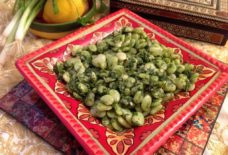In Israeli City of Haifa, a Liberal Palestinian Culture Blossoms
Diaa Hadid
The New York Times
At Elika, a bar in the Hadar neighborhood of this hilly port city, a 30-something psychodramatist rolled a cigarette and sipped coffee with her father, a well-known actor in Israel. The bartender poured tall beers for two women who wandered in for an afternoon pint. Nearby, a 22-year-old woman with a partly shaved head and colorful tattoos sat alone, working on her laptop.
They were among the many coifed, pierced and tattooed women and men who populate a slice of Haifa’s social scene that resembles that of the well-heeled hipsters of Tel Aviv. But here the cool kids are Palestinians, and they have unfurled a self-consciously Arab milieu that is secular, feminist and gay-friendly.
“Haifa is a center for Arabs, like Tel Aviv is a center for Jews,” said Asil Abu Wardeh, the Elika patron who practices a performance-based form of psychotherapy. “There is a cultural movement. There is a youth movement. There’s a kind of freedom here.”
“We have our own parties. Our own places. Our own discos. We dance. We drink. We do it all in Arabic,” she added. “This all began in Haifa.”
Arabs make up a fifth of Israel’s population of eight million, and in recent years, they have grown more assertive in expressing their Palestinian identity, allied with their brethren in East Jerusalem, the West Bank and the Gaza Strip.
But their public life in Haifa is a striking secular counterpoint to the conservatism of many of Israel’s Arab communities, where sex before marriage is taboo, and single men and women rarely date and tend to marry at relatively young ages, in matches often arranged by their mothers.
Haifa’s relative liberalism is a product of its unique, cosmopolitan tradition. It is easy for young, single people to get out in this city, which is built on a steep coastal hill, with Jews tending to live on its heights and Arabs by the sea. The once working-class city of 280,000 has several universities and has embraced its diversity. The 30,000 Arab residents, around 10 percent of the population, include equal numbers of Muslims and Christians, and they are generally wealthier and better educated than Arabs elsewhere in Israel.
This makes Haifa a comfortable place for liberal Palestinians who want not only to escape the constraints of conservative Arab communities but also to be among their own people.
“If you are in an Arab neighborhood, you have a community. If you live in a Jewish neighborhood, you are a stranger, and that gives you freedom as an Arab woman,” said Fidaa Hammoud, 32. “There are many de facto couples, and older women living alone without having to hear gossip.”
Source: www.nytimes.com


